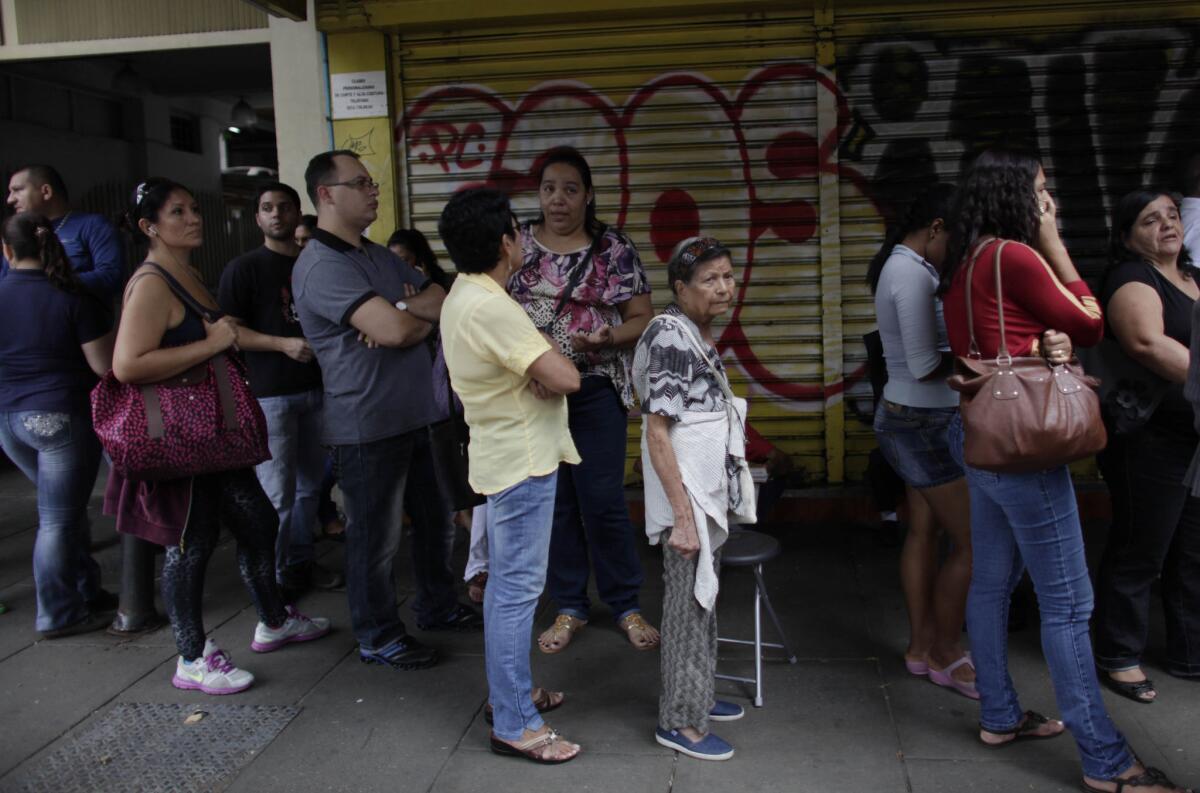Stuck in Venezuela with those currency exchange blues

- Share via
CARACAS, Venezuela--An elderly Caracas woman recently called a travel agency to buy an airline ticket to Argentina because of a family medical emergency. She was told that no seat on any plane leaving Venezuela was available at any price on any airline until next fall.
“There is essentially no availability of air tickets out of Caracas until September 2014,” said the travel agent, who dealt with the woman, and who spoke only on the condition of anonymity out of fear for government reprisals. “The destinations most in demand are Cuba, Miami, Colombia, Ecuador and Spain.”
The wait time for Venezuelan plane tickets to foreign destinations reflects a peculiar currency phenomenon called “credit card scratching” that has developed as a result of the disparity between the official and black market dollar exchange rate.
According to Venezuela’s official exchange rate, it takes only 6.3 bolivars, the national currency, to buy one U.S. dollar. But the scarcity of dollars that has resulted from government controls aimed at curbing inflation has made them worth up to 60 bolivars on the black market.
“People who need to send dollars to children or relatives living offshore will pay whatever it takes to get them,” said one recent buyer of dollars. “We have no choice.“
But Venezuelans who make it to Ecuador or Peru, for example, and who withdraw $3,000 in cash on their Visa or Mastercards, are charged only 18,900 bolivars on their credit card statement. After returning to Venezuela, they can sell that same $3,000 for 180,000 bolivars on the black market, or nearly 10 times their cost, producing a sizable profit.
Hence, the extreme demand for air travel.
In destinations such as Ecuador and Spain, businesses have sprung up to accommodate the credit card cash withdrawals, often charging commissions of as much as $500 on a $3,000 transaction, sources say.
Despite the galloping devaluation of bolivars on the unofficial market, the Venezuelan government is reluctant to officially devalue the currency ahead of Dec. 8 local elections because of the high short-term inflation such a move could produce, which could exacerbate already acute scarcities.
According to official central bank statistics, more than 21% of food items and essential household goods can be described as scarce in Venezuela, according to Jose Manuel Puente, a Venezuelan economist teaching at Oxford University.
Those scarcities hit the poor hardest because they can’t afford the inflated prices that better-off consumers pay on the black market.
“You have an economy in Venezuela in which probably the most profitable activity involves arbitraging of dollars, or getting dollars at the official rate and then selling them at a higher rate in black market, as opposed to actually investing those dollars in productive activities,” said Erich Arispe, director of a sovereign debt group at Fitch Ratings in New York.
ALSO:
U.S., Iran trade accusations over hitch in nuclear talks
Aid workers struggle to reach victims of Philippines typhoon
North Korea executes 80, some for minor offenses, newspaper says
Special correspondent Mogollon reported from Caracas and Kraul from Bogota, Colombia.
More to Read
Sign up for Essential California
The most important California stories and recommendations in your inbox every morning.
You may occasionally receive promotional content from the Los Angeles Times.










